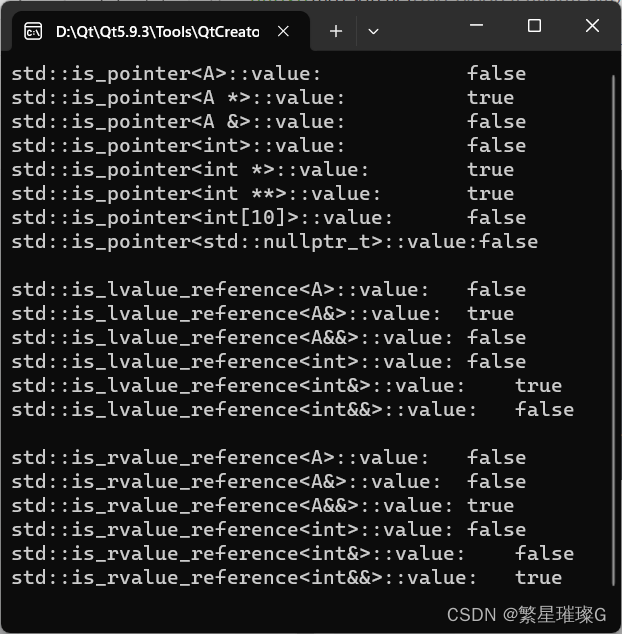C++标准模板(STL)- 类型支持 (类型特性,is_pointer,is_lvalue_reference,is_rvalue_reference)
类型特性
类型特性定义一个编译时基于模板的结构,以查询或修改类型的属性。
试图特化定义于 <type_traits> 头文件的模板导致未定义行为,除了 std::common_type 可依照其所描述特化。
定义于<type_traits>头文件的模板可以用不完整类型实例化,除非另外有指定,尽管通常禁止以不完整类型实例化标准库模板。
类型属性
定义于头文件 <type_traits>
基础类型类别
继承自 std::integral_constant
成员常量
| value [静态] | 若 T 为指针类型则为 true ,否则为 false(公开静态成员常量) |
成员函数
| operator bool | 转换对象为 bool ,返回 value(公开成员函数) |
| operator() (C++14) | 返回 value(公开成员函数) |
成员类型
| 类型 | 定义 |
value_type | bool |
type | std::integral_constant<bool, value> |
检查类型是否为指针类型
std::is_pointer| template< class T > | (C++11 起) |
检查 T 是否为指向对象指针或指向函数指针(但不是指向成员/成员函数指针)。若 T 是对象/函数指针类型,则提供等于 true 的成员常量 value 。否则, value 等于 false 。
模板形参
| T | - | 要检查的类型 |
辅助变量模板
| template< class T > | (C++17 起) |
可能的实现
template< class T > struct is_pointer_helper : std::false_type {};
template< class T > struct is_pointer_helper<T*> : std::true_type {};
template< class T > struct is_pointer :
is_pointer_helper<typename std::remove_cv<T>::type> {};检查类型是否为左值引用
std::is_lvalue_reference| template< class T > | (C++11 起) |
检查 T 是否为左值引用类型。若 T 是左值引用类型,则提供等于 true 的成员常量 value ,否则, value 等于 false 。
模板形参
| T | - | 要检查的类型 |
辅助变量模板
| template< class T > | (C++17 起) |
可能的实现
template<class T> struct is_lvalue_reference : std::false_type {};
template<class T> struct is_lvalue_reference<T&> : std::true_type {};检查类型是否为右值引用
std::is_rvalue_reference| template< class T > | (C++11 起) |
检查 T 是否为右值引用类型。若 T 是右值引用类型,则提供等于 true 的成员常量 value ,否则, value 等于 false 。
模板形参
| T | - | 要检查的类型 |
辅助变量模板
| template< class T > | (C++17 起) |
可能的实现
template <class T> struct is_rvalue_reference : std::false_type {};
template <class T> struct is_rvalue_reference<T&&> : std::true_type {};调用示例
#include <iostream>
#include <type_traits>
class A {};
int main()
{
std::cout << std::boolalpha;
std::cout << "std::is_pointer<A>::value: "
<< std::is_pointer<A>::value << std::endl;
std::cout << "std::is_pointer<A *>::value: "
<< std::is_pointer<A *>::value << std::endl;
std::cout << "std::is_pointer<A &>::value: "
<< std::is_pointer<A &>::value << std::endl;
std::cout << "std::is_pointer<int>::value: "
<< std::is_pointer<int>::value << std::endl;
std::cout << "std::is_pointer<int *>::value: "
<< std::is_pointer<int *>::value << std::endl;
std::cout << "std::is_pointer<int **>::value: "
<< std::is_pointer<int **>::value << std::endl;
std::cout << "std::is_pointer<int[10]>::value: "
<< std::is_pointer<int[10]>::value << std::endl;
std::cout << "std::is_pointer<std::nullptr_t>::value:"
<< std::is_pointer<std::nullptr_t>::value << std::endl;
std::cout << std::endl;
std::cout << "std::is_lvalue_reference<A>::value: "
<< std::is_lvalue_reference<A>::value << std::endl;
std::cout << "std::is_lvalue_reference<A&>::value: "
<< std::is_lvalue_reference<A&>::value << std::endl;
std::cout << "std::is_lvalue_reference<A&&>::value: "
<< std::is_lvalue_reference < A&& >::value << std::endl;
std::cout << "std::is_lvalue_reference<int>::value: "
<< std::is_lvalue_reference<int>::value << std::endl;
std::cout << "std::is_lvalue_reference<int&>::value: "
<< std::is_lvalue_reference<int&>::value << std::endl;
std::cout << "std::is_lvalue_reference<int&&>::value: "
<< std::is_lvalue_reference < int&& >::value << std::endl;
std::cout << std::endl;
std::cout << "std::is_rvalue_reference<A>::value: "
<< std::is_rvalue_reference<A>::value << std::endl;
std::cout << "std::is_rvalue_reference<A&>::value: "
<< std::is_rvalue_reference<A&>::value << std::endl;
std::cout << "std::is_rvalue_reference<A&&>::value: "
<< std::is_rvalue_reference < A&& >::value << std::endl;
std::cout << "std::is_rvalue_reference<int>::value: "
<< std::is_rvalue_reference<int>::value << std::endl;
std::cout << "std::is_rvalue_reference<int&>::value: "
<< std::is_rvalue_reference<int&>::value << std::endl;
std::cout << "std::is_rvalue_reference<int&&>::value: "
<< std::is_rvalue_reference < int&& >::value << std::endl;
std::cout << std::endl;
return 0;
}输出

